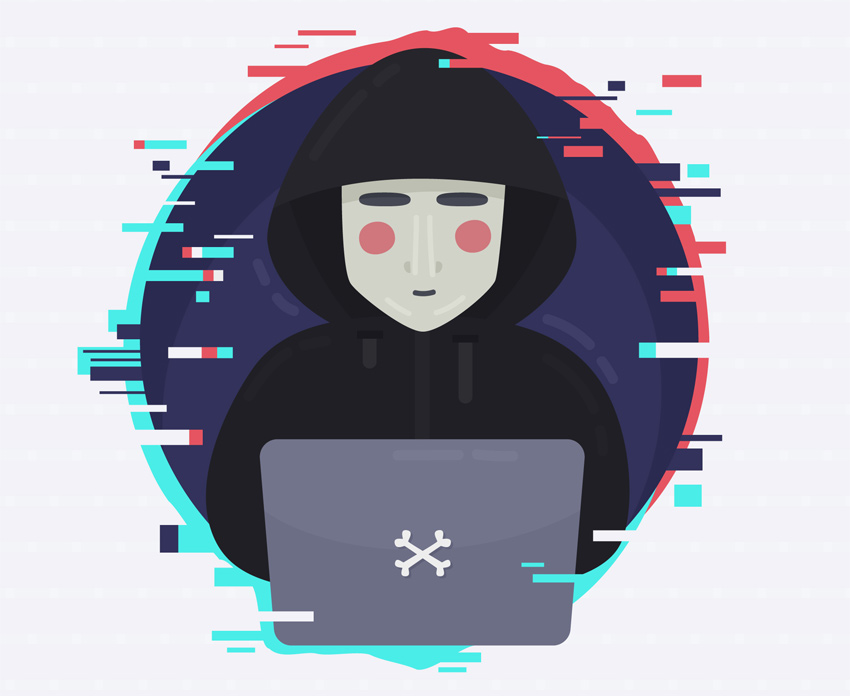Does a VPN Protect You from Hackers?

VPNs can do a lot – bypass firewalls and geo-blocks, hide your browsing, help you get better deals, etc.
But does a VPN protect you from hackers too? You probably know it encrypts your traffic, but does that mean you’re safe from all cyber attacks?
Well, here’s everything you need to know:
First Things First – How Does a VPN Work?
Before we answer that question, let’s take a quick look at how a VPN works. Feel free to come back to this section if you start feeling a bit lost down the road.
So, a VPN is an online service that hides your IP address and encrypts your traffic. That’s how all sites define it anyway, but how exactly does it do that? Here’s a basic explanation:
- You install the VPN app on your device. You then use it to connect to a VPN server.
- The app and the server negotiate and establish a connection between them (the so-called encrypted VPN tunnel).
- Any data that goes through that connection is encrypted end-to-end. Only the VPN server and app can decrypt it. Nobody else can monitor it.
- When you access a website, the app will send the connection request through your ISP’s network to the VPN server. The server will then route it to the site in question, effectively “hiding” your IP address because the website will only see the VPN server’s IP address.
- Similarly, your ISP will only see you connecting to the VPN server’s IP address. They won’t see the IP addresses of the websites you browse.
So, Does a VPN Protect You from Hackers?
The answer isn’t so simple since a VPN can’t protect you from every single type of cyber attack. But you should still definitely use one on public WiFi and even on your home network when handling sensitive stuff like online banking.
Okay got it, but does a VPN prevent hacking or not? That’s all I want to know man.
The best way to answer that question is to take a quick look at what VPNs can and can’t do to keep you safe:
A VPN Could Stop MITM Attacks
A MITM (Man-In-The-Middle) attack is when a hacker positions himself between you and the web server or person you’re trying to communicate with over the Internet.
There are many types of MITM attacks (HTTPS spoofing, SSL hijacking, DNS spoofing, etc.), so let’s focus on the one VPNs can protect against: WiFi eavesdropping.
That’s when cybercriminals abuse weak encryption standards with packet sniffers to intercept your data packets. They then try to decrypt them to steal sensitive information like credit card numbers or login credentials.
A shady person sitting in a coffee shop and intercepting your online communications sounds like a cliche hacker movie. But it’s more likely to happen than you think. Most WiFi networks use WPA2, and that security standard is vulnerable to cyber attacks. Sadly, not even WPA3 (the successor to WPA2) is completely foolproof.
So if a cybercriminal plays their cards right, they can run a successful MITM attack against you over a coffee shop’s public network or even your home WiFi. They could monitor your traffic or redirect you to malicious websites.
Pretty scary stuff. So does a VPN protect you from hackers in this situation?
Yes, pretty much. The service encrypts all your traffic, effectively preventing any hacker from monitoring it. Here’s how that helps:
- Cybercriminals can’t decrypt your data anymore. VPN encryption is very strong, and it’s nearly impossible for them to crack it. Most of the time, they can’t even intercept it.
- Hackers won’t be able to see your DNS queries because the VPN encrypts them. So they’ll have no idea what websites you browse. That means they won’t be able to redirect you to fake websites without alarming you. After all, ending up on a “paipaI.com” site when you wanted to browse Twitter is a pretty huge red flag.
VPNs Might Prevent Remote Hacking (But Not on Their Own)
Emphasis on “might.” Cybercriminals have many ways of remotely hacking into your computer. One of them involves knowing your IP address.
Yes, that’s a pretty far-fetched claim, and not every run-of-the-mill script kiddie can do it. However, some really skilled hackers (particularly from Russia) can use your IP address to break into your computer.
Apparently, the method involves exploiting Shared Resources, but doesn’t stop there. It also involves social engineering and malware.
So a VPN can offer a layer of protection by keeping your IP address hidden. It can’t do anything against phishing and malware (we’ll get to that in a bit), so you need to use common sense, firewalls, and antivirus protection too.
Of course, if the hacker already knows your IP address, there’s not much a VPN can do. See if your ISP is willing to change it, use a VPN to constantly hide the new IP address, and – in the meantime – keep your network protected.
A VPN Might Keep You Safe from DDoS/DoS Attacks
DDoS (Distributed Denial of Service) attacks are cyber attacks that flood your network with unwanted traffic and requests. The idea is to force you offline for hours on end. DoS (Denial of Service) attacks are like DDoS attacks, but weaker. They usually take you offline for a few minutes, but they’re still annoying.
Unfortunately, any wannabe hacker can run a DDoS attack nowadays. They can actually buy them on the dark web for as little as $10 per hour. It goes without saying that DoS attacks are even easier to run.

Technology vector created by pikisuperstar – www.freepik.com
Now here’s where the VPN comes into play. For a DDoS/DoS attack to be successful, the person running it needs to know your IP address. Without it, they can’t find and target your network.
Since a VPN hides your IP address, they can prevent DDoS/DoS attacks from targeting you. And some VPN servers even have anti-DDoS protection on them, offering even better protection.
Does a VPN protect you from hackers and their DDoS/DoS attacks all the time, though?
Not really. If a cybercriminal already knows your IP address, a VPN can’t really help you. Neither can the server’s anti-DDoS protection since the hacker will target your network, not the VPN server.
In that situation, it’s best to talk with your ISP. Maybe even alert the cops since DDoS/DoS attacks aren’t exactly legal.
A VPN Can Protect You from Fake WiFi Networks
A fake network is a hotspot set up by hackers that poses as legitimate WiFi – like an airport WiFi network or a coffee shop hotspot.
The idea is to lure in unsuspecting victims with the promise of free WiFi – something few people can resist, especially when you have to pass the time waiting for your order, train, or airplane.
When you connect to the fake hotspot, the person running it can monitor your online traffic and decrypt it. Mostly because these networks don’t use any encryption to begin with.
Sure, they won’t know what you type on PayPal because the site uses HTTPS encryption. But if they’re good and patient enough, they can eventually intercept enough data packets to find your login credentials.
And setting up a fake network isn’t very difficult for most hackers, really. They can just use a device like the WiFi Pineapple (only costs $100 or $200) to set one up. Then they just trick you or your device into connecting to their networks, and they’re all set.
But if you use a VPN, they can’t spy on your traffic because the service encrypts it. They’ll only see gibberish which they won’t be able to crack.
A VPN Won’t Stop Malware Attacks
Not all cyber attacks involve a hacker eavesdropping on unencrypted traffic or setting up fake networks. Many of them include malware – malicious software, files, and code that infect your device.
Malware can allow cybercriminals to:
- Take control over your device.
- Log your keystrokes or record your screen.
- Infect important files.
- Steal and delete important files.
- Encrypt your OS, restricting your access to it.
- Infect your whole network, and any other device that interacts with it.
The bad news is that a VPN can’t protect you from that. It might stop hackers from redirecting you to a malware-infected site through a MITM attack, but that’s about it. If your device comes into contact with malware, the VPN can’t do anything.
Only antivirus protection can help in that situation.
VPNs Can’t Really Protect You from Phishing Attacks
The best it can do is use a blocklist (sort of like a firewall) to block connections to malicious or shady domains. Like blocking a connection to “http://paipa1.xyz” for example.
However, a VPN can’t stop hackers from targeting you with phishing emails. It could block your connection if you click on a phishing link in an email, but that’s not going to happen all the time. Hackers create around 1.4 million phishing sites every month, so many of them will likely slip past the VPN’s blocklist.
Also, if you respond to a phishing email or download a malicious attachment, a VPN can’t keep you safe.
Can a VPN Be Hacked?
Okay so we know a VPN can offer some protection against hackers. But can cybercriminals compromise it?
They can, in fact. But it’s not as easy as it sounds. Most of the time, the cyber attacks hackers launch against VPNs only involve DDoS-ing their servers. Actually compromising a VPN’s servers and customer data tends to only happen if:
- The data center the VPN works with makes a huge mistake – like overlooking an insecure remote management system.
- Hackers exploit unknown vulnerabilities in the VPN software.
- Cybercriminals successfully target VPN providers with phishing attacks.
- Hackers manage to crack VPN encryption.
- The VPN suffers leaks (DNS, IPv6, or WebRTC). Not exactly a hack, but cybercriminals can exploit them.
Here’s the good news, though – stuff like that doesn’t really happen.
Hackers can’t crack VPN encryption because it’d take them decades (if not more) to brute-force it. And if you use a reliable provider with leak protection, no logs, thoroughly-tested software, and an experienced team that knows how to handle phishing attacks, you should be safe.
Useful Tips to Protect Yourself from Hackers
Besides using a VPN, here’s what else you should do:
- Install antivirus software on all your devices. Malwarebytes and ESET are good picks. Make sure you run scans regularly, and that you keep the software up-to-date.
- Keep firewalls enabled. They’re annoying sometimes, but they protect your network from malicious traffic.
- Use script blockers like uMatrix and uBlock Origin. They can keep you safe from malicious scripts and ads.
- Use anti-phishing extensions like NetCraft and MetaCert. Or, even better, use Stanford’s Anti-Phishing Browser Extensions. It’s a full suite of useful tools. Also, use our guide to better familiarize yourself with phishing attacks.
- Use a password manager. It’s a tool that stores all your passwords in one place, and encrypts them. They can alert you about phishing sites, and protect you from them with auto-fill features. Bitwarden and KeePassXC are good options.
- Enable 2FA (Two-Factor Authentication) or MFA (Multi-Factor Authentication) on all your accounts. If a hacker were to ever compromise them, they wouldn’t be able to log in without also having direct access to your phone.
- Change the default username and password on your router. Hackers could find them online in PDF manuals. While you’re at it, disable UPnP, WPS, and Remote Access too since those features make your network less secure.
- Keep all software and your OS up-to-date. Skipping out on an update could let hackers abuse vulnerabilities you had no idea about.
Need a Good VPN?
Try CactusVPN then. We offer a user-friendly service with powerful encryption, highly secure servers, and complete leak protection.
We also don’t keep any logs, offer a Kill Switch, and use reliable protocols like OpenVPN, IKEv2, and SoftEther.
Special Deal! Get CactusVPN for $3.5/mo!
And once you do become a CactusVPN customer, we’ll still have your back with a 30-day money-back guarantee.
Does a VPN Prevent Hacking? What Are Your Thoughts?
So does a VPN protect you from hackers or not?
Well, it’s not a simple “yes” or “no” answer. Yes, a VPN does offer some protection, but it’s not going to keep you safe from all cyber attacks. You need to use it alongside other tools like antimalware software, script blockers, and anti-phishing extensions.
What is your opinion, though? Can VPN a protect against hackers or not?
Looking forward to hearing your thoughts. Also, feel free to mention anything we forgot to cover.



